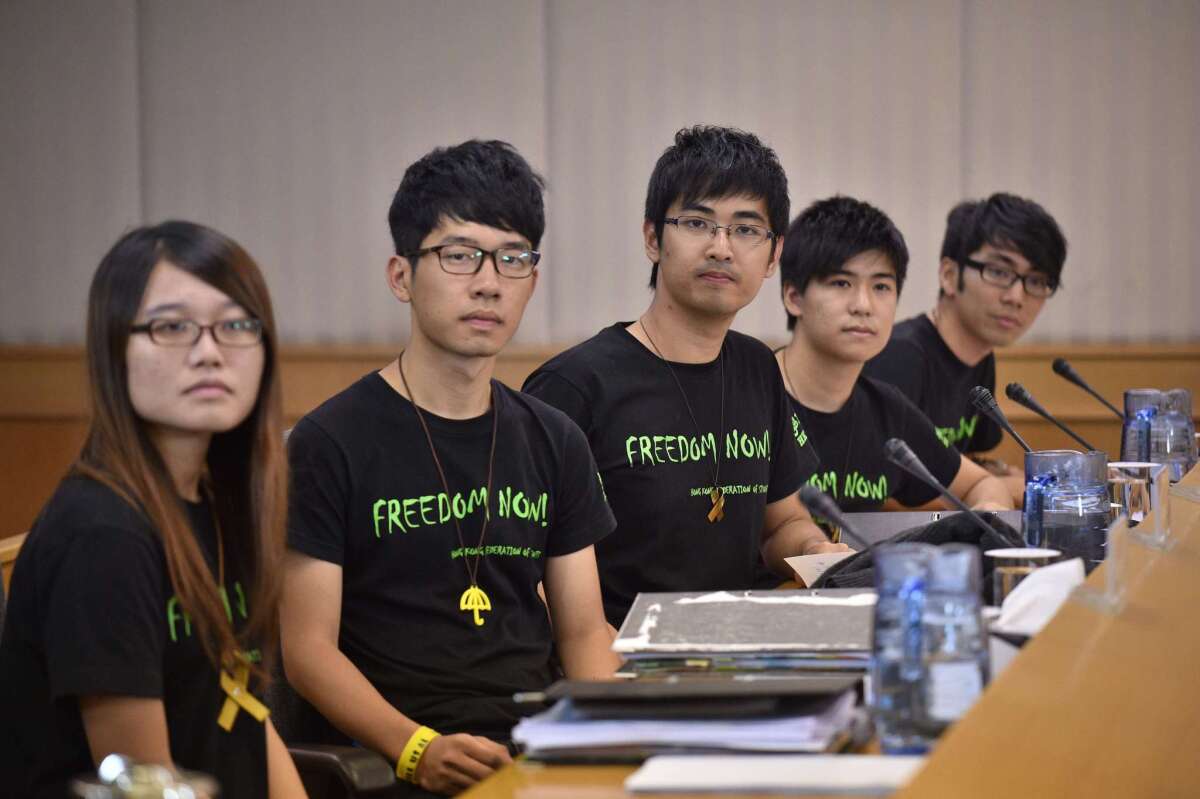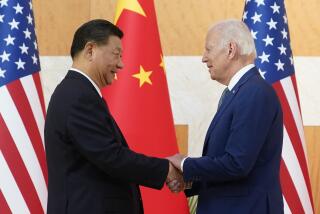Hong Kong student protest leaders seek talks with Beijing officials

Reporting from Hong Kong â Student organizers of Hong Kongâs pro-democracy protests said Wednesday that they will seek a direct dialogue with Chinaâs top leadership during an important international summit in Beijing next week.
Three to five representatives of the Hong Kong Federation of Students are planning to travel to the Chinese capital to seek talks with Prime Minister Li Keqiang or another senior leader during the Asia-Pacific Economic Cooperation summit, said Yvonne Leung, spokeswoman for the group. The exact date of the trip is to be determined.
Whether the students will be granted entry to the mainland remains to be seen. Leung said the representatives have the necessary travel permits but acknowledged there was a chance they could be turned away.
Several Hong Kong officials have attempted to discourage the students from making the journey. Hong Kong Chief Secretary Carrie Lam, the No. 2 official in the semi-autonomous Chinese territory, said the idea was âunrealistic,â adding that the Hong Kong government has already heard the studentsâ demands.
Jasper Tsang, head of the Hong Kong legislature and a pro-establishment lawmaker, said if there is no middleman to line up a meeting, chances were slim that the students could meet with any top officials.
Alex Chow, secretary-general of the Federation, said students would write to deputies in Chinaâs National Peopleâs Congress and the Chinese Peopleâs Political Consultative Conference to request help to schedule a meeting.
The studentsâ move to press Beijing at this time risks presenting Chinese leaders with an unwelcome distraction while more than a dozen world leaders -- including President Obama -- are in Beijing for the APEC gathering.
Critics of the trip said by going directly to Beijing, students may be leaving no room for the Hong Kong government to maneuver and negotiate.
But Leung said direct dialogue with the central government is crucial to solve the political crisis.
âThe Hong Kong government needs to take lots of responsibility for whatâs going on, but if we want a practical change, we still need to communicate with the Beijing government,â she said.
Protesters in Hong Kong, a former British territory that returned to Chinese rule in 1997 under a framework known as âone country, two systems,â took to the streets in late September to denounce rules laid out by the standing committee of Chinaâs National Peopleâs Congress for the cityâs chief executive election in 2017.
The rules would limit candidates in the election to two or three people approved by a special committee, which is expected to be packed with pro-establishment figures.
A two-hour dialogue between protest leaders and five Hong Kong government officials last month yielded little common ground. The session was first of what was expected to be several rounds of talks aimed at resolving the political crisis, but a second round of talks has yet to be scheduled.
The decision to seek a meeting with top mainland leaders is not a rush move, Leung said, adding that the Federation of Students has consulted with other protest supporters and organizers, including lawmakers from Hong Kongâs so-called Pan-Democratic camp, Occupy Central With Love and Peace, the student group Scholarism and other nongovernmental organizations.
âWe want to really see what [Chinese leaders] think about the idea of making a change to the NPCâs decision and really try to find a way out,â said Leung.
Leung rejected the idea that going to Beijing represented an âescalationâ of the movement. She said the Federation is willing to make more compromises, including retreating from the streets, if the government shows some willingness to improve the elections process.
âI have always believed that staying on the street is not the only way, because we have already been here around 40 days, and the government has basically finished digesting the influence,â Leung said. âIf we are going to simply stay on the street without doing anything, that will be backfire eventually on us.â
Leung said in Beijing the group would call for the withdrawal of the NPC decision, emphasizing that it is inconsistent with the Basic Law that governed the 1997 handover. At the same time, she said the delegation would seek to reassure Beijing that the democracy movement is not a âcolor revolution.â
âWe are not going to overturn the Communist regime. We are not asking for the independence of Hong Kong. We just want to fulfill the promise of âone country, two systems,â â said Leung.
Protesters took to the streets ânot because of us. They did this because they were discontent with the [election] proposal,â she added. âThatâs why only the government can persuade them to go home.â
Leung conceded she felt pessimistic about the chances of getting a high-ranking official to meet with the Federation of Students delegation. But Hong Kong people, she said, want to see whether the central government will follow its promise to rule the country by law.
âPeople need to see the truth,â Leung said. âWhen we say political problems need to be handled politically, that doesnât mean politics doesnât include law. We all understand that if law ends, then tyranny will begin.â
Hui is a special correspondent.
More to Read
Sign up for Essential California
The most important California stories and recommendations in your inbox every morning.
You may occasionally receive promotional content from the Los Angeles Times.










